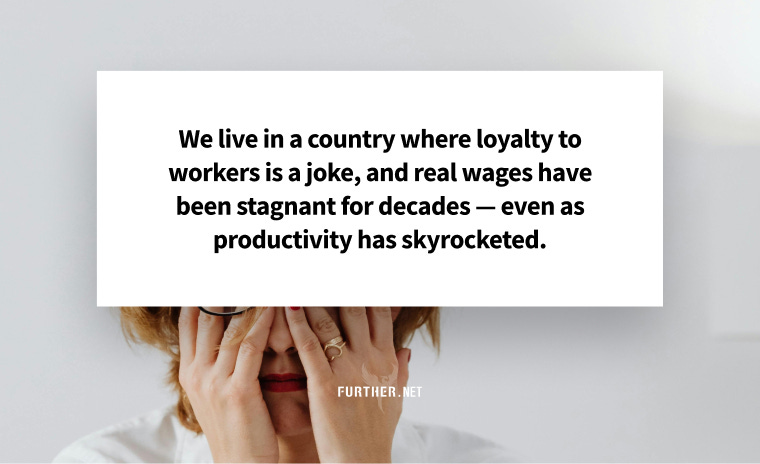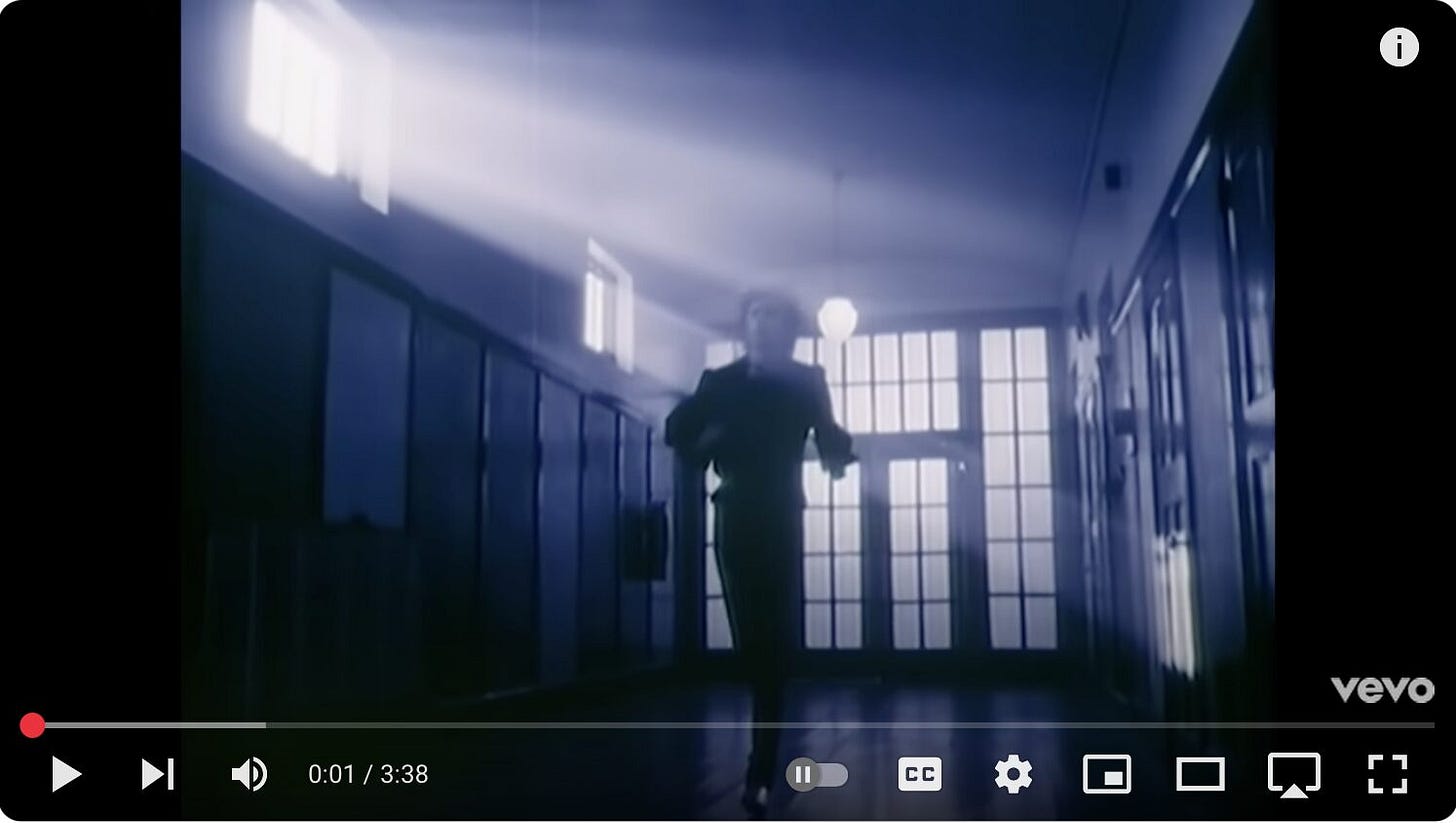Why Millions Are Saying No to a J.O.B.
People want independence from the unreasonable constraints and control of traditional employment.
Join 19,000+ people looking to live their best life at midlife by grabbing our free resource: The Further Guide to Unretirement Planning. Or upgrade to Further Premium for the full experience.
Remember when “working from home” was a coveted, but elusive, freedom?
Throughout the late 1980s and into the 90s, there were business opportunities, correspondence courses, and commission-only sales jobs that promised the ability to earn a living from your comfy abode.
This tells us something important: Most office jobs suck.
Before the Industrial Revolution, there was more than a thousand-year period of home-based work. Nowadays, we’re seeing a dramatic return to working from home, although in a fundamentally different context.
In the modern era, the allure of a work-from-home (WFH) position dates back to the 1950s. Companies such as Tupperware and other multilevel marketing firms offered women the chance to earn money without leaving the home — an “opportunity” you’ll still see promoted on Facebook to this day.
Fast-forward to the emergence of the commercial internet in the mid-1990s, and freelance creative professionals expanded the WFH movement. Whether from hip Soho lofts or a spare bedroom in Spokane, working for yourself meant freedom from needing an office as well.
In 1997, a young lawyer turned speechwriter named Dan Pink documented the growing trend in an article entitled “Free Agent Nation” for the 12th issue of Fast Company magazine. He told of a future dominated by independent contractors and project-based work similar to the “Hollywood model” of assembling talented teams on a project-by-project basis.
Given that I was one of those “free agents” at the time, Dan and I ended up chatting over email, which led to an interview over steaming plates of migas at Magnolia Café in Austin. Next thing you know, the late 90s era of my story was featured in Free Agent Nation, the book.
Dan wasn’t wrong. He (and I) were just a bit ahead of the times. The “free agent revolution” had started, but it would play out over the subsequent two decades and will continue to accelerate as we move forward in time.
From Free Agents to 7-Figure Solopreneurs
By the 2010s, the ranks of freelancers, consultants, and work-from-wherever digital entrepreneurs continued to grow. The term “solopreneur” came into being, with many of these tiny businesses making seven figures without employees or investors, a trend that’s accelerating.
Corporate employees were largely out of luck when it came to WFH freedom during this period. Then the pandemic hit. Everyone with an office job suddenly had to work from home.
Some loved it. Some struggled. Some took the opportunity to escape the tyranny of geography and left the country, thinking they had the perfect situation — location-independence and a steady paycheck with minimal hassle from management.
I knew a couple of people at the time who were working on launching their own location-independent businesses. As soon as the lockdowns hit, they took off and decided all their lifestyle objectives had been met under the “new normal.”
And while I offered encouraging words, my internal monologue was saying:
Oh, you sweet summer child.
Back-to-office mandates were inevitable. While corporations should only be concerned with the work getting done, that’s not how hierarchical groups of humans work. One way or another, it comes down to control, not raw productivity.
If you only think in terms of “remote work” or “work from home,” things indeed have changed. An estimated 68% of U.S. employers offer some form of work-location flexibility, while only one-third of companies require full-time, in-office presence.
But here’s the catch: What most employers offer is called structured hybrid. This means “companies set specific requirements for when employees should come in physically to work, such as specific days, a minimum number of days, or a percentage of time.”
So, you work from home some days, while being monitored by the company's Virtual Private Network (VPN) or Zero Trust Network Access (ZTNA) software. Then you come into the office and wonder what your manager thinks of you and how you fared as the subject of inevitable coworker gossip sessions.
Add in artificial intelligence systems that document your time and productivity levels, and the surveillance state is already here. Orwell got the initial Big Brother wrong, while Steve Jobs got it right.
The only way to achieve location independence without fear of being called back or laid off is total independence from traditional employment. And that’s what millions of people are choosing at an increasing rate.
The Talent Strikes Back
We live in a country where loyalty to workers is a joke, and real wages have been stagnant for decades — even as productivity has skyrocketed.
Meanwhile, the cost of housing, groceries, and healthcare are pushing people to the brink, leading more than ever to claim their independence via freelancing, consulting, and digital entrepreneurship.
According to MBO Partners’ newly released State of Independence report, 72.2 million people are doing independent work, with 27.7 million pursuing it full-time. Miles Everson, CEO of MBO Partners, deems the trend toward independent work as the “Independent By Choice” movement:
It reflects a shift in the balance of power from companies to workers as the social contract between employers and workers has broken down. Workers are drawing conclusions along the lines, “I no longer want to work for one place that can fire me at a moment’s notice. I’m going to have seven income streams to support my family.”
Pundits have been predicting a shift to a workforce primarily populated by independent contractors of all types since before Pink’s Free Agent Nation dropped. The fact that it’s accelerating now despite the tight labor market suggests that it’s the workers who want change more than the employers.
People want independence from the unreasonable constraints and control of traditional employment. Location-independence has been a recent happy byproduct, fueling the number of digital nomads and expats over the last two decades.
Now, add in the fact that the social contract between the United States and its citizens is also being intentionally dismantled. Location independence has become the most important component given what many see coming.
That’s especially true if what you’re trying to avoid goes beyond office politics. If this is you, the best thing you can do is start today with small, intentional steps toward freedom.
Keep going-
P.S. New to Further? Join us here. Free subscribers, ready to upgrade to Further Premium?
further: destinations
Greece is Europe’s New Golden Visa Hotspot
For years, gaining EU residency through investment has been focused on Portugal. And then the residential real estate option was eliminated, a victim of its own success.
A new Mediterranean contender has stepped up, though. Greece now offers something Portugal no longer does: a Golden Visa through residential property investment.
Cerro Azul: Panama's Mountain Retreat
What if your ideal new home base combines cloud forest serenity with proximity to a cosmopolitan capital… all at a fraction of the cost of similar surroundings in the States?
That's exactly what you’ll find in Cerro Azul, Panama. It's a mountain retreat just 22 miles from Panama City that delivers an unexpected blend of natural beauty and practical connectivity.
further: flashback
🎶 The J. Geils Band - Centerfold, Freeze Frame, 1981 🎶
Centerfold hit #1 on the U.S. Billboard Hot 100 in February 1982 and held that spot for six consecutive weeks. I think my middle school friends and I knew what a centerfold was at that point, but wouldn't have had a clue of what to do if we actually encountered one. (YouTube)
further: sharing
Enjoy this issue? Please forward this email to friends or share by clicking below:
Thank you for sharing Further!




Nice post! Wow, that took me back. I did some work for Dan many moons ago. What a great guy. Free Agent Nation was a revelation.
Thanks for this, Brian! My husband and I left during the pandemic and haven’t looked back. Thankfully, it has worked for us.